
Heinrich Heine
Christian Johann Heinrich Heine was one of the most significant German poets of the 19th century. He was also a journalist, essayist, and literary critic. He is best known outside Germany for his early lyric poetry, which was set to music in the form of Lieder (art songs) by composers such as Robert Schumann and Franz Schubert. Heine's later verse and prose is distinguished by its satirical wit and irony. His radical political views led to many of his works being banned by German authorities. Heine spent the last 25 years of his life as an expatriate in Paris.
If you like author Heinrich Heine here is the list of authors you may also like
Buy books on AmazonTotal similar authors (31)
-
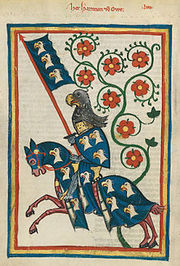
Hartmann von Aue
Hartmann von Aue († vermutlich zwischen 1210 und 1220) gilt neben Wolfram von Eschenbach und Gottfried von Straßburg als der bedeutendste Epiker der sogenannten mittelhochdeutschen Klassik um 1200. Gemeinsam mit Heinrich von Veldeke steht er am Beginn des aus Frankreich übernommenen höfischen Romans. Von ihm sind die Verserzählungen Erec, Gregorius oder Der gute Sünder, Der arme Heinrich, Iwein, ein unter dem Namen Klagebüchlein bekanntes allegorisches Streitgespräch sowie einige Minne- und Kreuzlieder überliefert.
Buy books on Amazon -

Wilhelm Busch
Heinrich Christian Wilhelm Busch was an influential German caricaturist, painter, and poet who is famed for his satirical picture stories with rhymed texts.
Buy books on Amazon
After initially studying mechanical engineering and then art in Düsseldorf, Antwerp, and Munich, he turned to drawing caricatures. One of his first picture stories, Max and Moritz (published in 1865), was an immediate success and has achieved the status of a popular classic and perennial bestseller. -

Joseph von Eichendorff
Joseph Freiherr von Eichendorff (March 10, 1788 – November 26, 1857) was a German poet and novelist of the later German romantic school.
Buy books on Amazon
Eichendorff is regarded as one of the most important German Romantics and his works have sustained high popularity in Germany from production to the present day. -

Wolfram von Eschenbach
Wolfram von Eschenbach was a German knight and poet, regarded as one of the greatest epic poets of his time. As a Minnesinger, he also wrote lyric poetry.
Buy books on Amazon
Little is known of Wolfram's life. There are no historical documents which mention him, and his works are the sole source of evidence. In Parzival he talks of wir Beier ("we Bavarians") and the dialect of his works is East Franconian. This and a number of geographical references have resulted in the present-day Wolframs-Eschenbach, previously Obereschenbach, near Ansbach in Bavaria, being officially designated as his birthplace. However, the evidence is circumstantial and not without problems - there are at least four other places named Eschenbach in present-day Bavaria, and Wolframs-Esche -

Walter Benjamin
Walter Bendix Schönflies Benjamin was a German Jewish philosopher, cultural critic, media theorist, and essayist. An eclectic thinker who combined elements of German idealism, Romanticism, Western Marxism, Jewish mysticism, and neo-Kantianism, Benjamin made influential contributions to aesthetic theory, literary criticism, and historical materialism. He was associated with the Frankfurt School and also maintained formative friendships with thinkers such as playwright Bertolt Brecht and Kabbalah scholar Gershom Scholem. He was related to German political theorist and philosopher Hannah Arendt through her first marriage to Benjamin's cousin Günther Anders, though the friendship between Arendt and Benjamin outlasted her marriage to Anders.
Buy books on Amazon -

Friedrich Nietzsche
Friedrich Wilhelm Nietzsche was a German classical scholar, philosopher, and critic of culture, who became one of the most influential of all modern thinkers. He began his career as a classical philologist before turning to philosophy. He became the youngest person to hold the Chair of Classical Philology at the University of Basel in 1869 at the age of 24, but resigned in 1879 due to health problems that plagued him most of his life; he completed much of his core writing in the following decade. In 1889, at age 44, he suffered a collapse and afterward a complete loss of his mental faculties, with paralysis and probably vascular dementia. He lived his remaining years in the care of his mother until her death in 1897 and then with his sister
Buy books on Amazon -

Franz Kafka
Prague-born writer Franz Kafka wrote in German, and his stories, such as " The Metamorphosis " (1916), and posthumously published novels, including The Trial (1925), concern troubled individuals in a nightmarishly impersonal world.
Buy books on Amazon
Jewish middle-class family of this major fiction writer of the 20th century spoke German. People consider his unique body of much incomplete writing, mainly published posthumously, among the most influential in European literature.
His stories include "The Metamorphosis" (1912) and " In the Penal Colony " (1914), whereas his posthumous novels include The Trial (1925), The Castle (1926) and Amerika (1927).
Despite first language, Kafka also spoke fluent Czech. Later, Kafka acquired some knowledge of -

Max Frisch
Max Rudolph Frisch was born in 1911 in Zurich; the son of Franz Bruno Frisch (an architect) and Karolina Bettina Frisch (née Wildermuth). After studying at the Realgymnasium in Zurich, he enrolled at the University of Zurich in 1930 and began studying German literature, but had to abandon due to financial problems after the death of his father in 1932. Instead, he started working as a journalist and columnist for the Neue Zürcher Zeitung (NZZ), one of the major newspapers in Switzerland. With the NZZ he would entertain a lifelong ambivalent love-hate relationship, for his own views were in stark contrast to the conservative views promulgated by this newspaper. In 1933 he travelled through eastern and south-eastern Europe, and in 1935 he vis
Buy books on Amazon -

Virginia Woolf
(Adeline) Virginia Woolf was an English novelist and essayist regarded as one of the foremost modernist literary figures of the twentieth century.
Buy books on Amazon
During the interwar period, Woolf was a significant figure in London literary society and a member of the Bloomsbury Group. Her most famous works include the novels Mrs. Dalloway (1925), To the Lighthouse (1927), and Orlando (1928), and the book-length essay A Room of One's Own (1929) with its famous dictum, "a woman must have money and a room of her own if she is to write fiction." -
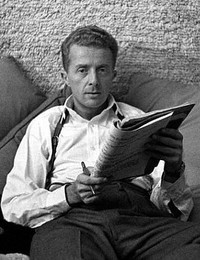
Paul Bowles
Paul Frederic Bowles grew up in New York, and attended college at the University of Virginia before traveling to Paris, where became a part of Gertrude Stein's literary and artistic circle. Following her advice, he took his first trip to Tangiers in 1931 with his friend, composer Aaron Copeland.
Buy books on Amazon
In 1938 he married author and playwright Jane Auer (see: Jane Bowles). He moved to Tangiers permanently in 1947, with Auer following him there in 1948. There they became fixtures of the American and European expatriate scene, their visitors including Truman Capote, Tennessee Williams and Gore Vidal. Bowles continued to live in Tangiers after the death of his wife in 1973.
Bowles died of heart failure in Tangier on November 18, 1999. His ashes were int -

Gotthold Ephraim Lessing
Gotthold Ephraim Lessing was a German writer, philosopher, dramatist, publicist, and art critic, and one of the most outstanding representatives of the Enlightenment era. His plays and theoretical writings substantially influenced the development of German literature. He is widely considered by theatre historians to be the first dramaturg.
Buy books on Amazon
Lessing was born in Kamenz, a small town in Saxony. His father was a clergyman and the author of theological writings. After visiting Latin School in Kamenz (from 1737 onwards) and the Fürstenschule St. Afra in Meissen (from 1741 onwards) he studied theology and medicine in Leipzig (1746–1748).
From 1748 to 1760 he lived in Leipzig and Berlin and worked as reviewer and editor for, amongst others, the Voss -

Fernando Pessoa
Fernando António Nogueira Pessoa was a poet and writer.
Buy books on Amazon
It is sometimes said that the four greatest Portuguese poets of modern times are Fernando Pessoa. The statement is possible since Pessoa, whose name means ‘person’ in Portuguese, had three alter egos who wrote in styles completely different from his own. In fact Pessoa wrote under dozens of names, but Alberto Caeiro, Ricardo Reis and Álvaro de Campos were – their creator claimed – full-fledged individuals who wrote things that he himself would never or could never write. He dubbed them ‘heteronyms’ rather than pseudonyms, since they were not false names but “other names”, belonging to distinct literary personalities. Not only were their styles different; they thought differently, they h -

Victor Hugo
After Napoleon III seized power in 1851, French writer Victor Marie Hugo went into exile and in 1870 returned to France; his novels include The Hunchback of Notre Dame (1831) and Les Misérables (1862).
Buy books on Amazon
This poet, playwright, novelist, dramatist, essayist, visual artist, statesman, and perhaps the most influential, important exponent of the Romantic movement in France, campaigned for human rights. People in France regard him as one of greatest poets of that country and know him better abroad. -

Knut Hamsun
Novels of Norwegian writer Knut Hamsun (born Knud Pedersen), include Hunger (1890) and The Growth of the Soil (1917). He won the Nobel Prize for literature in 1920.
Buy books on Amazon
He insisted on the intricacies of the human mind as the main object of modern literature to describe the "whisper of the blood, and the pleading of the bone marrow." Hamsun pursued his literary program, debuting in 1890 with the psychological novel Hunger. -

Lion Feuchtwanger
Lion Feuchtwanger was a German Jewish emigre. A renowned novelist and playwright who fled Europe during World War II and lived in Los Angeles from 1941 until his death.
Buy books on Amazon
A fierce critic of the Nazi regime years before it assumed power precipitated his departure, after a brief internment in France, from Europe. He and his wife Marta obtained asylum in the United States in 1941 and remained there in exile until they died. -

Thomas Mann
Librarian Note: There is more than one author in the GoodReads database with this name. See this thread for more information.
Buy books on Amazon
See also:
Serbian: Tomas Man
Thomas Mann was a German novelist, short story writer, social critic, philanthropist, essayist, and Nobel Prize laureate in 1929, known for his series of highly symbolic and ironic epic novels and novellas, noted for their insight into the psychology of the artist and the intellectual. His analysis and critique of the European and German soul used modernized German and Biblical stories, as well as the ideas of Goethe, Nietzsche, and Schopenhauer. His older brother was the radical writer Heinrich Mann, and three of his six children, Erika Mann, Klaus Mann and Golo Mann, also became important -

Mario Vargas Llosa
Jorge Mario Pedro Vargas Llosa, 1st Marquess of Vargas Llosa, more commonly known as Mario Vargas Llosa, was a Peruvian novelist, journalist, essayist, and politician. Vargas Llosa was one of the Spanish language and Latin America's most significant novelists and essayists and one of the leading writers of his generation. Some critics consider him to have had a more substantial international impact and worldwide audience than any other writer of the Latin American Boom. In 2010, he won the Nobel Prize in Literature "for his cartography of structures of power and his trenchant images of the individual's resistance, revolt, and defeat".
Buy books on Amazon
Vargas Llosa rose to international fame in the 1960s with novels such as The Time of the Hero (La ciudad y l -

Stefan Zweig
Stefan Zweig was one of the world's most famous writers during the 1920s and 1930s, especially in the U.S., South America, and Europe. He produced novels, plays, biographies, and journalist pieces. Among his most famous works are Beware of Pity, Letter from an Unknown Woman, and Mary, Queen of Scotland and the Isles. He and his second wife committed suicide in 1942.
Buy books on Amazon
Zweig studied in Austria, France, and Germany before settling in Salzburg in 1913. In 1934, driven into exile by the Nazis, he emigrated to England and then, in 1940, to Brazil by way of New York. Finding only growing loneliness and disillusionment in their new surroundings, he and his second wife committed suicide.
Zweig's interest in psychology and the teachings of Sigmund Freu -

Joseph Roth
Joseph Roth, journalist and novelist, was born and grew up in Brody, a small town near Lemberg in East Galicia, part of the easternmost reaches of what was then the Austro-Hungarian empire and is now Ukraine. Roth was born into a Jewish family. He died in Paris after living there in exile.
Buy books on Amazon
http://www.josephroth.de/ -

Heinrich Böll
Der deutsche Schriftsteller und Übersetzer gilt als einer der bedeutendsten deutschen Autoren der Nachkriegszeit. Er schrieb Gedichte, Kurzgeschichten und Romane, von denen auch einige verfilmt wurden. Dabei setzte er sich kritisch mit der jungen Bundesrepublik auseinander. Zu seinen erfolgreichsten Werken zählen "Billard um halbzehn", "Ansichten eines Clowns" und "Gruppenbild mit Dame". Den Nobelpreis für Literatur bekam Heinrich Böll 1972; er war nach 43 Jahren der erste deutsche Schriftsteller, dem diese Auszeichnung zuteil wurde. 1974 erschien sein wohl populärstes Werk, "Die verlorene Ehre der Katharina Blum". Durch sein politisches Engagement wirkte er, gemeinsam mit seinem Freund Lew Kopelew, auf die europäische Literatur der Nachkri
Buy books on Amazon -
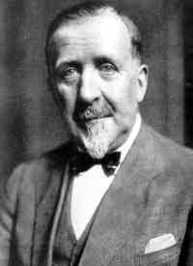
Heinrich Mann
A German novelist who wrote works with social themes whose attacks on the authoritarian and increasingly militaristic nature of post-Weimar German society led to his exile in 1933.
Buy books on Amazon
Born in Lübeck as the oldest child of Thomas Johann Heinrich Mann and Júlia da Silva Bruhns. He was the elder brother of Thomas Mann. His father came from a patrician grain merchant family and was a Senator of the Hanseatic city. After the death of his father, his mother moved the family to Munich, where Heinrich began his career as a freier Schriftsteller or free novelist. -

Clarice Lispector
Clarice Lispector was a Brazilian writer. Acclaimed internationally for her innovative novels and short stories, she was also a journalist. Born to a Jewish family in Podolia in Western Ukraine, she was brought to Brazil as an infant, amidst the disasters engulfing her native land following the First World War.
Buy books on Amazon
She grew up in northeastern Brazil, where her mother died when she was nine. The family moved to Rio de Janeiro when she was in her teens. While in law school in Rio she began publishing her first journalistic work and short stories, catapulting to fame at age 23 with the publication of her first novel, 'Near to the Wild Heart' (Perto do Coração Selvagem), written as an interior monologue in a style and language that was considered re -

Georg Büchner
Karl Georg Büchner was a German dramatist and writer of prose. He was the brother of physician and philosopher Ludwig Büchner. Georg Büchner's talent is generally held in great esteem in Germany. It is widely believed that, but for his early death, he might have attained the significance of such central German literary figures as Johann Wolfgang von Goethe and Friedrich Schiller.
Buy books on Amazon -
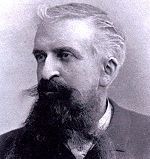
Gustave Le Bon
A social psychologist, sociologist, and amateur physicist. He was the author of several works in which he expounded theories of national traits, racial superiority, herd behavior and crowd psychology.
Buy books on Amazon
See also Гюстав Ле Бон -
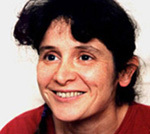
Magdalena Tulli
In 1995 Magdalena Tulli got Kościelscy Award. She was shortlisted for the NIKE Award two times. Her books were translated to English, German, French, Czech, Hungarian and Latvian. She is a member of Polish Writers Society. In 2007 she got a special award - distinction of Gdynia Literary Award.
Buy books on Amazon
She translated a few books: The anger of heaven by Fleur Jaeggy (for this translation from Italian she received the award of Literature of the world magazine), Amerigo's long day by Italo Calvino and Lost by Marcel Proust. -

Baltasar Gracián
Baltasar Gracián y Morales, SJ, formerly Anglicized as Baltazar Gracian, was a Spanish Jesuit and baroque prose writer and philosopher. He was born in Belmonte, near Calatayud (Aragón). His proto-existentialist writings were lauded by Nietzsche and Schopenhauer.
Buy books on Amazon
The son of a doctor, in his childhood Gracián lived with his uncle, who was a priest. He studied at a Jesuit school in 1621 and 1623 and theology in Zaragoza. He was ordained in 1627 and took his final vows in 1635.
He assumed the vows of the Jesuits in 1633 and dedicated himself to teaching in various Jesuit schools. He spent time in Huesca, where he befriended the local scholar Vincencio Juan de Lastanosa, who helped him achieve an important milestone in his intellectual upbringing. -
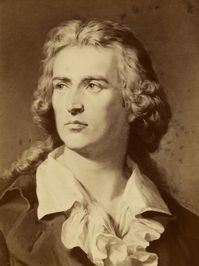
Friedrich Schiller
People best know long didactic poems and historical plays, such as Don Carlos (1787) and William Tell (1804), of leading romanticist German poet, dramatist, and historian Johann Christoph Friedrich von Schiller.
Buy books on Amazon
This philosopher and dramatist struck up a productive if complicated friendship with already famous and influential Johann Wolfgang von Goethe during the last eighteen years of his life and encouraged Goethe to finish works that he left merely as sketches; they greatly discussed issues concerning aesthetics and thus gave way to a period, now referred to as classicism of Weimar. They also worked together on Die Xenien ( The Xenies ), a collection of short but harsh satires that verbally attacked perceived enemies of the -

E.T.A. Hoffmann
Ernst Theodor Wilhelm Hoffmann, better known by his pen name E. T. A. Hoffmann (Ernst Theodor Amadeus Hoffmann), was a German Romantic author of fantasy and horror, a jurist, composer, music critic, draftsman and caricaturist. His stories form the basis of Jacques Offenbach's famous opera The Tales of Hoffmann, in which Hoffman appears (heavily fictionalized) as the hero. He is also the author of the novella The Nutcracker and the Mouse King, on which the famous ballet The Nutcracker is based. The ballet Coppélia is based on two other stories that Hoffmann wrote, while Schumann's Kreisleriana is based on Hoffmann's character Johannes Kreisler.
Buy books on Amazon
Hoffmann's stories were very influential during the 19th century, and he is one of the major author -
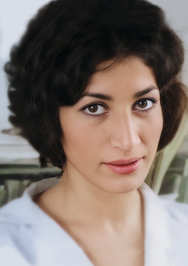
Forugh Farrokhzad
Forough Farrokhzad was born in Tehran to career military officer Colonel Mohammad Bagher Farrokhzad and his wife Touran Vaziri-Tabar in 1935. The third of seven children, she attended school until the ninth grade, then was taught painting and sewing at a girl's school for the manual arts. At age sixteen she was married to Parviz Shapour, an acclaimed satirist.
Buy books on Amazon
Within two years, in 1954, Farrokhzad and her husband divorced; Parviz won custody of the child. She moved back to Tehran to write poetry and published her first volume, entitled The Captive, in 1955.
In 1958 she spent nine months in Europe. After returning to Iran, in search of a job she met film-maker and writer Ebrahim Golestan, who reinforced her own inclinations to express herself -
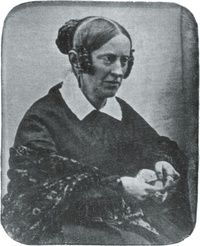
Annette von Droste-Hülshoff
Freiin Annette Elisabeth von Droste-Hülshoff was a 19th-century German poet, writer, and composer. Freiin translates from German to English as baroness, and von indicates nobility. She was one of the most important German poets and author of the novella Die Judenbuche.
Buy books on Amazon -
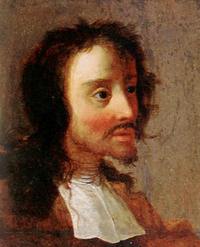
Hans Jakob Christoffel von Grimmelshausen
Grimmelshausen was born at Gelnhausen. At the age of ten he was kidnapped by Hessian soldiery, and in their midst tasted the adventures of military life in the Thirty Years' War. At its close, Grimmelshausen entered the service of Franz Egon von Fürstenberg, bishop in Straßburg and in 1665 was made Schultheiss (magistrate) at Renchen in Baden.
Buy books on Amazon
On obtaining this appointment, he devoted himself to literary pursuits, and in 1668 published Der abenteuerliche Simplicissimus Teutsch, d.h. die Beschreibung des Lebens eines seltsamen Vaganten, genannt Melchior Sternfels von Fuchsheim, the greatest German novel of the 17th century. For this work he took as his model the picaresque romances of Spain, already to some extent known in Germany. Simpliciss